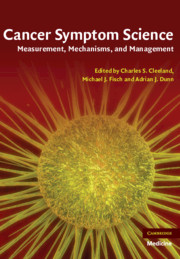Book contents
- Frontmatter
- Contents
- Contributors
- Foreword
- Credits and acknowledgements
- Section 1 Introduction
- Section 2 Cancer Symptom Mechanisms and Models: Clinical and Basic Science
- 4 The clinical science of cancer pain assessment and management
- 5 Pain: basic science
- 5a Mechanisms of disease-related pain in cancer: insights from the study of bone tumors
- 5b The physiology of neuropathic pain
- 6 Cognitive dysfunction: is chemobrain real?
- 7 Cognitive impairment: basic science
- 8 Depression in cancer: pathophysiology at the mind-body interface
- 9 Depressive illness: basic science
- 9a Animal models of depressive illness and sickness behavior
- 9b From inflammation to sickness and depression: the cytokine connection
- 10 Cancer-related fatigue: clinical science
- 11 Developing translational animal models of cancer-related fatigue
- 12 Cancer anorexia/weight loss syndrome: clinical science
- 13 Appetite loss/cachexia: basic science
- 14 Sleep and its disorders: clinical science
- 15 Sleep and its disorders: basic science
- 16 Proteins and symptoms
- 17 Genetic approaches to treating and preventing symptoms in patients with cancer
- 18 Functional imaging of symptoms
- 19 High-dose therapy and posttransplantation symptom burden: striking a balance
- Section 3 Clinical Perspectives In Symptom Management and Research
- Section 4 Symptom Measurement
- Section 5 Government and Industry Perspectives
- Section 6 Conclusion
- Index
- Plate section
- References
14 - Sleep and its disorders: clinical science
from Section 2 - Cancer Symptom Mechanisms and Models: Clinical and Basic Science
Published online by Cambridge University Press: 05 August 2011
- Frontmatter
- Contents
- Contributors
- Foreword
- Credits and acknowledgements
- Section 1 Introduction
- Section 2 Cancer Symptom Mechanisms and Models: Clinical and Basic Science
- 4 The clinical science of cancer pain assessment and management
- 5 Pain: basic science
- 5a Mechanisms of disease-related pain in cancer: insights from the study of bone tumors
- 5b The physiology of neuropathic pain
- 6 Cognitive dysfunction: is chemobrain real?
- 7 Cognitive impairment: basic science
- 8 Depression in cancer: pathophysiology at the mind-body interface
- 9 Depressive illness: basic science
- 9a Animal models of depressive illness and sickness behavior
- 9b From inflammation to sickness and depression: the cytokine connection
- 10 Cancer-related fatigue: clinical science
- 11 Developing translational animal models of cancer-related fatigue
- 12 Cancer anorexia/weight loss syndrome: clinical science
- 13 Appetite loss/cachexia: basic science
- 14 Sleep and its disorders: clinical science
- 15 Sleep and its disorders: basic science
- 16 Proteins and symptoms
- 17 Genetic approaches to treating and preventing symptoms in patients with cancer
- 18 Functional imaging of symptoms
- 19 High-dose therapy and posttransplantation symptom burden: striking a balance
- Section 3 Clinical Perspectives In Symptom Management and Research
- Section 4 Symptom Measurement
- Section 5 Government and Industry Perspectives
- Section 6 Conclusion
- Index
- Plate section
- References
Summary
Sleep disturbances are common in patients with cancer yet are often neglected. Most of the sleep studies conducted in patients with cancer have been related almost exclusively to insomnia; other kinds of sleep disturbances – for example, sleep-disordered breathing and periodic limb movement – have rarely been studied in relation to cancer. Systematic research into other sleep disorders commonly seen in the general population, such as circadian-rhythm disturbances and restless legs syndrome, is rare in patients with cancer.
To understand the relationship between sleep disorders and cancer, one must first have a general understanding of the various sleep disorders. The sleep disorders most common in patients with cancer are insomnias, sleep-related breathing disorders, sleep-related movement disorders, and circadian-rhythm sleep disorders. In this chapter we present a brief introduction of several of these relatively common sleep problems, followed by discussion of the prevalence, possible reasons, and treatment of sleep disturbance in cancer and a consideration of future research and treatment directions.
Common sleep disorders
Insomnia
Insomnia is defi ned as diffi culty with sleep initiation or maintenance that (1) occurs despite adequate time and opportunity for sleep, and (2) results in some form of daytime impairment, such as clinically significant distress, fatigue, or impairment in social, occupational, or other important areas of functioning. Insomnia can be divided into two types of complaints, depending upon the duration of the sleep difficulty.
- Type
- Chapter
- Information
- Cancer Symptom ScienceMeasurement, Mechanisms, and Management, pp. 160 - 169Publisher: Cambridge University PressPrint publication year: 2010



